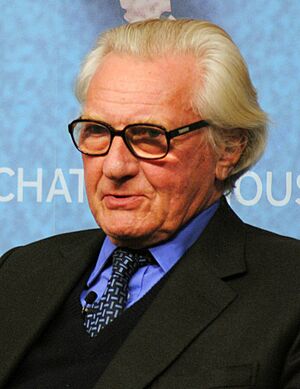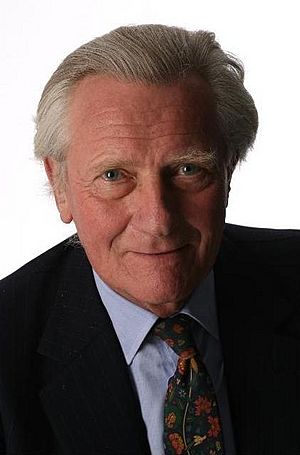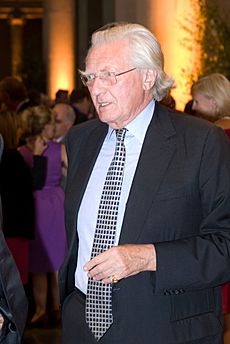Michael Heseltine facts for kids
Quick facts for kids
The Lord Heseltine
|
|||||||||||||||||||||||||||||||||||||||||||||||||||||||||||||||
|---|---|---|---|---|---|---|---|---|---|---|---|---|---|---|---|---|---|---|---|---|---|---|---|---|---|---|---|---|---|---|---|---|---|---|---|---|---|---|---|---|---|---|---|---|---|---|---|---|---|---|---|---|---|---|---|---|---|---|---|---|---|---|---|

Heseltine in 2013
|
|||||||||||||||||||||||||||||||||||||||||||||||||||||||||||||||
| Deputy Prime Minister of the United Kingdom | |||||||||||||||||||||||||||||||||||||||||||||||||||||||||||||||
| In office 5 July 1995 – 2 May 1997 |
|||||||||||||||||||||||||||||||||||||||||||||||||||||||||||||||
| Prime Minister | John Major | ||||||||||||||||||||||||||||||||||||||||||||||||||||||||||||||
| Preceded by | Geoffrey Howe | ||||||||||||||||||||||||||||||||||||||||||||||||||||||||||||||
| Succeeded by | John Prescott | ||||||||||||||||||||||||||||||||||||||||||||||||||||||||||||||
| First Secretary of State | |||||||||||||||||||||||||||||||||||||||||||||||||||||||||||||||
| In office 5 July 1995 – 2 May 1997 |
|||||||||||||||||||||||||||||||||||||||||||||||||||||||||||||||
| Prime Minister | John Major | ||||||||||||||||||||||||||||||||||||||||||||||||||||||||||||||
| Preceded by | Barbara Castle | ||||||||||||||||||||||||||||||||||||||||||||||||||||||||||||||
| Succeeded by | John Prescott | ||||||||||||||||||||||||||||||||||||||||||||||||||||||||||||||
| Secretary of State for Trade and Industry President of the Board of Trade |
|||||||||||||||||||||||||||||||||||||||||||||||||||||||||||||||
| In office 11 April 1992 – 5 July 1995 |
|||||||||||||||||||||||||||||||||||||||||||||||||||||||||||||||
| Prime Minister | John Major | ||||||||||||||||||||||||||||||||||||||||||||||||||||||||||||||
| Preceded by | Peter Lilley | ||||||||||||||||||||||||||||||||||||||||||||||||||||||||||||||
| Succeeded by | Ian Lang | ||||||||||||||||||||||||||||||||||||||||||||||||||||||||||||||
| Secretary of State for the Environment | |||||||||||||||||||||||||||||||||||||||||||||||||||||||||||||||
| In office 28 November 1990 – 11 April 1992 |
|||||||||||||||||||||||||||||||||||||||||||||||||||||||||||||||
| Prime Minister | John Major | ||||||||||||||||||||||||||||||||||||||||||||||||||||||||||||||
| Preceded by | Chris Patten | ||||||||||||||||||||||||||||||||||||||||||||||||||||||||||||||
| Succeeded by | Michael Howard | ||||||||||||||||||||||||||||||||||||||||||||||||||||||||||||||
| In office 5 May 1979 – 6 January 1983 |
|||||||||||||||||||||||||||||||||||||||||||||||||||||||||||||||
| Prime Minister | Margaret Thatcher | ||||||||||||||||||||||||||||||||||||||||||||||||||||||||||||||
| Preceded by | Peter Shore | ||||||||||||||||||||||||||||||||||||||||||||||||||||||||||||||
| Succeeded by | Tom King | ||||||||||||||||||||||||||||||||||||||||||||||||||||||||||||||
| Secretary of State for Defence | |||||||||||||||||||||||||||||||||||||||||||||||||||||||||||||||
| In office 6 January 1983 – 9 January 1986 |
|||||||||||||||||||||||||||||||||||||||||||||||||||||||||||||||
| Prime Minister | Margaret Thatcher | ||||||||||||||||||||||||||||||||||||||||||||||||||||||||||||||
| Preceded by | John Nott | ||||||||||||||||||||||||||||||||||||||||||||||||||||||||||||||
| Succeeded by | George Younger | ||||||||||||||||||||||||||||||||||||||||||||||||||||||||||||||
|
|||||||||||||||||||||||||||||||||||||||||||||||||||||||||||||||
|
|||||||||||||||||||||||||||||||||||||||||||||||||||||||||||||||
|
|||||||||||||||||||||||||||||||||||||||||||||||||||||||||||||||
| Personal details | |||||||||||||||||||||||||||||||||||||||||||||||||||||||||||||||
| Born |
Michael Ray Dibdin Heseltine
21 March 1933 Swansea, Wales |
||||||||||||||||||||||||||||||||||||||||||||||||||||||||||||||
| Political party | Conservative | ||||||||||||||||||||||||||||||||||||||||||||||||||||||||||||||
| Spouse |
Anne Williams
(m. 1962) |
||||||||||||||||||||||||||||||||||||||||||||||||||||||||||||||
| Children | 3, including Annabel | ||||||||||||||||||||||||||||||||||||||||||||||||||||||||||||||
| Alma mater | Pembroke College, Oxford | ||||||||||||||||||||||||||||||||||||||||||||||||||||||||||||||
| Signature | |||||||||||||||||||||||||||||||||||||||||||||||||||||||||||||||
| Military service | |||||||||||||||||||||||||||||||||||||||||||||||||||||||||||||||
| Allegiance | |||||||||||||||||||||||||||||||||||||||||||||||||||||||||||||||
| Branch/service | |||||||||||||||||||||||||||||||||||||||||||||||||||||||||||||||
| Years of service | 1959 | ||||||||||||||||||||||||||||||||||||||||||||||||||||||||||||||
| Rank | Second lieutenant | ||||||||||||||||||||||||||||||||||||||||||||||||||||||||||||||
| Unit | Welsh Guards | ||||||||||||||||||||||||||||||||||||||||||||||||||||||||||||||
Michael Ray Dibdin Heseltine, Baron Heseltine, CH, PC (born 21 March 1933) is a British politician. He started his career in property and co-founded a publishing company called Haymarket Media Group in 1957. Heseltine was a Conservative MP from 1966 to 2001. He was an important figure in the governments of Margaret Thatcher and John Major. He served as Deputy Prime Minister under John Major from 1995 to 1997.
Heseltine joined the government's top team, the Cabinet, in 1979. He became Secretary of State for the Environment, where he supported the "Right to Buy" campaign. This allowed people living in council houses (public housing) to buy their homes. He was known for being good with the media and a strong minister. He often disagreed with Margaret Thatcher on money matters. He was one of the ""wets"" who believed in ""One Nation" conservatism". This meant he supported helping all parts of society. For example, he helped to rebuild Liverpool in the early 1980s when it was struggling.
From 1983 to 1986, he was Secretary of State for Defence. In this role, he strongly opposed the Campaign for Nuclear Disarmament. He resigned from the Cabinet in 1986 because of the Westland affair, a disagreement about a helicopter company. After this, he became a critic of Thatcher, especially because of her views on Europe. In 1990, he challenged Thatcher for the leadership of the Conservative Party. He got enough votes to stop her from winning outright in the first round. After Thatcher resigned, Heseltine lost to John Major but returned to the Cabinet as Environment Secretary.
As a key supporter of John Major, Heseltine was made President of the Board of Trade and Secretary of State for Trade and Industry after the 1992 election. He supported Major when his leadership was challenged in 1995. In return, he was promoted to Deputy Prime Minister. After the Conservatives lost the 1997 election, he did not try to become party leader. He served in Major's shadow cabinet for a short time.
Heseltine became a life peer in 2001, which means he joined the House of Lords for life. He has continued to speak out on political issues. He has criticized Brexit and Boris Johnson after the 2016 Brexit vote. In 2019, he was temporarily suspended from the Conservative Party for saying he would vote for the Liberal Democrats in the European Parliament election. His party membership was restored in July 2024.
Contents
Early Life and Education
Michael Heseltine was born in Swansea, Wales, on 21 March 1933. His father, Rupert Dibdin Heseltine, was a factory owner and served in the Royal Engineers during the Second World War. His mother was Eileen Ray. Michael's family had a history in the tea trade. His grandfather moved to Swansea because it was a major port for tea shipments.
Heseltine grew up in a comfortable home in Swansea. He attended several schools, including Bromsgrove School and Shrewsbury School. He enjoyed angling (fishing) as a child.
University Days at Oxford
Heseltine went to Pembroke College, Oxford. While there, he became interested in student politics. He worked hard to improve his public speaking skills, even practicing in front of a mirror. He was eventually elected President of the Oxford Union, a famous debating society.
He studied Philosophy, Politics, and Economics. He graduated with a good degree, even though he focused a lot on his activities outside of studying.
Business Career
Starting Out in Property
After university, Heseltine started training as an accountant in 1955. At the same time, he began building a property business in London. He and his friend Ian Josephs bought and renovated properties, then sold them for a profit. This helped them double their initial money.
They bought more houses and turned them into a boarding house called the "New Court Hotel." Heseltine sometimes even cooked breakfast for the guests. He became a millionaire at a young age.
Founding Haymarket Media Group
In 1957, Heseltine partnered with another Oxford friend, Clive Labovitch. They started a magazine publishing company called Cornmarket. They created successful directories like Opportunities for Graduates, which made money from advertising.
Their business grew, but they faced financial challenges in the early 1960s. Heseltine managed to avoid bankruptcy by making deals with his creditors (people he owed money to). In 1964, Cornmarket merged with a larger printing company, British Printing Corporation (BPC), to form Haymarket.
Haymarket expanded by acquiring and launching new magazines. They launched Management Today and Campaign, which became very successful. Heseltine was known for his energy and new ideas in publishing.
National Service
In January 1959, Heseltine was called up for National Service, which was compulsory military service at the time. He joined the Welsh Guards. He trained as an officer and was commissioned as a second lieutenant. He was granted leave to campaign in the 1959 general election. He was later excused from the rest of his service due to business reasons.
Haymarket's Continued Growth
Heseltine resigned as managing director of Haymarket in 1969 when he became a senior politician. However, he remained a major shareholder. In the 1970s, he and other directors bought out BPC's share, giving Heseltine and his family control of Haymarket.
Haymarket continued to grow and became very profitable. Heseltine's ownership of the company made him a large personal fortune. By 2013, his estimated wealth was around £264 million. His son Rupert now manages the company.
Political Career
Early Parliamentary Years
Heseltine first ran for Parliament in 1959 and 1964 but was not elected. In 1966, he was elected as the MP for Tavistock. He worked hard in his constituency, even touring rural areas in a caravan.
In 1974, his constituency was abolished due to boundary changes. He then became the MP for Henley, a seat he held until 2001.
Minister under Edward Heath (1970–1974)
In 1970, Prime Minister Edward Heath appointed Heseltine as a junior minister in the Department of Transport. He later moved to the new Department for the Environment. In 1972, he was promoted to Minister for Aerospace.
One of his main tasks was to help sell the Concorde supersonic jet. He worked hard to promote it, even though it was expensive and had limited range. He also played a key role in setting up the European Space Agency in 1973. During this time, he earned the nickname "Tarzan" from a political opponent, due to his energetic style.
In Opposition (1975–1979)
After the Conservatives lost the 1974 election, Heseltine became a spokesman for Industry in the opposition. He was known for his powerful speeches at party conferences. In 1976, he was moved to the role of Shadow Environment Secretary. He campaigned strongly for the sale of council houses.
Secretary of State for the Environment (1979–1983)
When Margaret Thatcher became Prime Minister in 1979, Heseltine became Secretary of State for the Environment. This was his first time in the Cabinet. He loved this job and worked to make big changes.
Council House Sales
Heseltine strongly supported the "Right to Buy" policy. This allowed people living in council houses to buy their homes, often at a discount. This policy was a huge social change. Over a million council houses were sold, which helped more people become homeowners. Heseltine saw this as a major achievement, giving people more control over their lives.
Local Government and Riots
Heseltine also worked to control spending by local councils. He introduced a system called "MINIS" to track how departments were spending money. He also helped to cut the number of civil servants.
In 1981, after riots in cities like Brixton and Toxteth, Heseltine was sent to help. He spent a lot of time in Liverpool, working to bring government money and business investment to the city. He helped set up the first National garden festival in Liverpool in 1984. He also supported the creation of Urban Development Corporations to rebuild inner-city areas.
Secretary of State for Defence (1983–1986)
In 1983, Heseltine became Secretary of State for Defence. One of his main tasks was to campaign against the Campaign for Nuclear Disarmament (CND). He argued for Britain to keep its nuclear weapons. He was very active in public debates and often appeared at military bases.
He also worked to make the Ministry of Defence more efficient. He merged different parts of the armed forces to improve coordination. He also pushed for more competition in defence contracts to save money.
The Westland Affair
In 1985, a disagreement arose over the future of Westland helicopters, a British company. Heseltine wanted Westland to join a European group of companies. Prime Minister Thatcher and others preferred a deal with an American company. This led to a major political argument.
Heseltine felt that Thatcher was not allowing open discussion. He resigned from the Cabinet on 9 January 1986. This was a very public and dramatic resignation. He felt that the government's decision-making process was flawed.
Out of Office (1986–1990)
After resigning, Heseltine spent time campaigning around the country. He gave many speeches and maintained good relationships with journalists. He wrote two books: Where There's A Will and The Challenge of Europe: Can Britain Win?. In these books, he shared his ideas on economic policy and European cooperation.
He often disagreed with the government's policies, especially the Poll Tax. He believed it was unfair. He was seen as a potential future leader of the Conservative Party.
1990 Leadership Challenge
In November 1990, Heseltine challenged Margaret Thatcher for the leadership of the Conservative Party. He believed he could lead the party to another election victory. In the first round of voting, he received enough votes to prevent Thatcher from winning outright.
Thatcher then decided to resign as Prime Minister. In the second round of voting, Heseltine lost to John Major. He immediately accepted defeat and supported Major.
Career under John Major (1990–1997)
Return to Environment Secretary (1990–1992)
John Major appointed Heseltine as Environment Secretary again. One of his main tasks was to reform the unpopular Poll Tax. He worked with other ministers to replace it with the new Council Tax, which was based on property value.
He also explored ideas like elected city mayors and merging local councils to make them more efficient. He played a role in Manchester's bid to host the 1996 Olympic Games.
President of the Board of Trade (1992–1995)
After the 1992 election, Heseltine became Secretary of State for Trade and Industry, also known as the "President of the Board of Trade." He wanted to help British companies succeed.
Pit Closures
In 1992, Heseltine announced the closure of many coal pits, leading to the loss of thousands of jobs. This was a very controversial decision and caused public anger. The government argued that the pits were losing too much money. Heseltine faced strong criticism but eventually, the closures went ahead.
Health and Return to Politics
In June 1993, Heseltine suffered a heart attack. He took four months off to recover. Despite health concerns, he returned to politics with renewed energy. He became known as an elder statesman.
He continued to promote British trade around the world. He also tried to privatize parts of the Post Office, but this plan was not approved by Parliament.
Deputy Prime Minister (1995–1997)
In 1995, John Major faced a leadership challenge. Heseltine remained loyal to Major. After Major won, he promoted Heseltine to Deputy Prime Minister and First Secretary of State. This gave him a very powerful role in government. He chaired several important Cabinet committees.
He strongly opposed holding a referendum on joining the Euro (the single European currency). He believed referendums were not good for decision-making. He also played a key role in planning the Millennium Dome exhibition in Greenwich.
Retirement and Later Views
After the Conservatives lost the 1997 general election, Heseltine decided not to run for party leadership due to his age and health. He was made a Member of the Order of the Companions of Honour.
He retired from Parliament in 2001 and became a life peer in the House of Lords, taking the title Baron Heseltine. He has remained an active voice in British politics. He supported David Cameron for Conservative leader in 2005.
In 2012, he led an audit of the UK's industrial performance. He also developed "Plan H" or "No Stone Left Unturned" to help local areas grow. Many of his ideas have been adopted by the government.
Views on Brexit
Heseltine has been a strong critic of Brexit (Britain leaving the European Union). He called the 2016 referendum result "the greatest constitutional crisis of modern times." He has argued that Brexit will make Britain poorer and less influential.
He has called for a second referendum on Brexit. In May 2019, he was suspended from the Conservative Party for saying he would vote for the Liberal Democrats in the European Parliament election because of his strong opposition to Boris Johnson's Brexit policy. His party membership was restored in July 2024.
Family and Personal Life
Heseltine married Anne Harding Williams in 1962. They have three children: Annabel, Alexandra, and Rupert, and nine grandchildren.
In 1964, an incident occurred with his mother's Alsatian dog. Heseltine subdued the animal using its choke collar after it had attacked him. The dog was put down the next day at the vet's insistence, because it had become dangerous and a threat to his pregnant wife and elderly mother.
In 2017, Heseltine was fined for careless driving after an incident in 2016 involving a cyclist.
Thenford Gardens and Arboretum
The Heseltines bought Thenford House and its grounds in 1976. They have spent many years restoring and developing the gardens and arboretum (a collection of trees). The arboretum covers over 70 acres and has more than 3,000 different types of trees and shrubs.
Their gardens have been featured on television and are open to the public by appointment.
Honours
- List of awards and honours received by Michael Heseltine
Books
- Michael Heseltine, Life in the Jungle, Hodder & Stoughton, 2000, ISBN: 0-340-73915-0, Heseltine's autobiography.
- Anne Heseltine, Michael Heseltine, Thenford: The Creation of an English Garden, Head of Zeus, 2016, ISBN: 978-1784979737
See also
 In Spanish: Michael Heseltine para niños
In Spanish: Michael Heseltine para niños
- Opposition to Brexit
- People's Vote
 | Jewel Prestage |
 | Ella Baker |
 | Fannie Lou Hamer |



